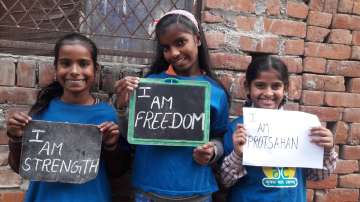Paradigm shift in online learning post-Covid era helping unprivileged kids to rewrite their destiny
Online learning became significant during the pandemic, allowing content to reach poor and unprivileged children through the click of a button.

Covid-19 pandemic has divided educational scenarios into two eras, viz pre-Covid usually dealing in face-to-face model and post-Covid era which is more of digital education. But this sudden shoving of education into digital mode had its own bottlenecks and constraints.
While according to a UNESCO COVID Monitoring website, approximately 1.72 billion learners have been affected due to the closure of educational institutions, 321 million Indian children were hindered in continuing education. Of course, these children belonged to the poor and underprivileged communities, who were already facing the wrath of no income, vulnerability to Covid, and other exigencies. Adding to the toil, at least 27 per cent of students (NCERT survey) do not have access to smartphones or laptops to attend online classes.
The situation was no different in Delhi slums, where AROH Foundation has been implementing its projects like Padho aur Badho and remedial education project ‘RISE’ (Remedial Innovation in School Education) for more than a decade now, having covered over 50,000 needy children till date.
ALSO READ: IIT Madras records 100% placement for management courses, average salary up by 30% to Rs 16.66 lakh
In slums like Sangam Vihar, Mundka, Ghevra, or Rani Kheda, where the struggle is for food and survival, education takes a back seat, especially for the girl child. Due to familial lethargy towards education, government initiatives have not made an effect here. Despite talk of the strides Delhi’s education system has made in infrastructure and methodologies, the academic progress of slum children has been an uphill battle. And so, the need for project RISE, which integrates the educational, physical, and emotional well-being of the children by improving their educational needs, provisional nutritional and co-curricular activities was the need of the hour.
The project is run in a hub and spoke model, wherein each cluster of 10 centres is run under one nodal centre. In each class, 50 students (25 girls and 25 boys) are enrolled under one educator. It incorporates provisions for community engagement via door-to-door awareness, focus-group discussions, and rallies, among other activities. Educators at AROH maintain a direct link with school authorities to receive feedback about children on the aforementioned aspects.
With the integration of the Blended Learning Modules (BLM) pedagogy in RISE, AROH caters to both face-to-face and digital education modes much before the advent of the pandemic. BLM is a uniquely designed audio-video curriculum easily grasped by the students and stays longer in their memories. RISE, a unique child-centric model focuses on the need and requirements of each child for his/her scholastic improvement, healthcare, and psychological and mental build-ups through a bouquet of interventions. RISE started in 2016 in the slums of Sangam Vihar and Mundka of Delhi. By far RISE has catered to more than 5,000 children.
The educators were well-trained while in service and TLMs, examination & evaluation SOPS were put in place a year before the COVID happened. Through these BLMs, RISE could support over 2,000 children to continue their education in the Covid and subsequent two years of lockdown. The children whose families had migrated back to their native villages could also remain connected and were supported during the lockdown.
“As victims of job loss and health crisis, parents of these children had no means to provide for online classes. RISE with its free online mode of teaching-learning methods ruled out investing any extra penny in this preparation,” a project coordinator at the AROH Foundation, said.
RISE staff also doubled up as community welfare workers during the COVID lockdowns, facilitating relief work.
While Azim Premji University highlighted that around 82% of children lost the foundational ability of the previous year’s learning during COVID lockdown, we enquired RISE children about it.
“No nothing is forgotten, Divya Didi (his educator) made us revise all concepts multiple times through video calls, online home works and also the exams kept happening during the lockdown,” Chintu, a class 5th student from one of the government-run schools in Mundka region of Delhi, said.
Calling RISE a futuristic project, Neelam Gupta, founder president & CEO, AROH Foundation, said, “Especially after the pandemic, RISE is proud to claim that learning never stopped even for a day, as the NGO was far-sighted enough to understand the digital shift of education much before. A key aspect of coping with Covid-19 was to ensure that learning remains a continuous process virtually. That was an ideal time to accept technology and its latest offerings in order to make education delivery to students more efficient and make it more productive through online learning and assessments."
Also, RISE is not restricted to core areas of education and learning, it also doubles up its services to neutralize various social issues in the target communities. The educators also are given regular in-service training and capacity building. Parallel livelihood training like jewellery making, Rakhi making, and handicraft items from waste is done to ensure their livelihood and dignity.
Regular counselling of parents is done for improved retention and learning outcomes. Mothers are given personalized and community-based services to deal with various issues related to women. Women groups are formed, trained, and placed back in communities as ‘ambassadors of change’. It’s a holistic approach to changing the educational scenario in the most indigent communities.